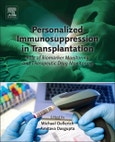The book is written for pathologists, toxicologists, and transplant surgeons who are involved in the management of transplant patients, offering them in-depth coverage of the management of immunosuppressant therapy in transplant patients with the goal of maximum benefit from drug therapy and minimal risk of drug toxicity.
This book also provides practical guidelines for managing immunosuppressant therapy, including the therapeutic ranges of various immunosuppressants, the pitfalls of methodologies used for determination of these immunosuppressants in whole blood or plasma, appropriate pharmacogenomics testing for organ transplant recipients, and when biomarker monitoring could be helpful.
Please Note: This is an On Demand product, delivery may take up to 11 working days after payment has been received.
Table of Contents
Chapter 1. Overview of the pharmacology and toxicology of immunosuppressant agents that require therapeutic drug monitoring
Chapter 2. Limitations of Immunoassays Used for Therapeutic Drug Monitoring of Immunosuppressants
Chapter 3. Application of liquid chromatography combined with mass spectrometry or tandem mass spectrometry for therapeutic drug monitoring of immunosuppressants
Chapter 4. Monitoring Free Mycophenolic Acid Concentration: Is There any Clinical Advantage?
Chapter 5. Pharmacogenomics aspect of immunosuppressant therapy
Chapter 6. Biomarker monitoring in immunosuppressant therapy: An overview
Chapter 7. Graft-derived cell-free DNA as a Marker of Graft Integrity after Transplantation
Chapter 8. Biomarkers of tolerance in kidney transplantation
Chapter 9. Intracellular concentrations of immunosuppressants
Chapter 10. Markers of lymphocyte activation and proliferation
Chapter 11. Monitoring Calcineurin inhibitors response based on NFAT-regulated gene expression
Authors
Michael Oellerich Lower Saxony Distinguished Professor of Clinical Chemistry, George-August University, University Medical Center Göttingen, Department of Clinical Pharmacology, Göttingen, Germany. Michael Oellerich, MD, HonMD, FACB, FAMM, FFPath (RCPI), FRCPath, is a chemical pathologist. Since 2012, he has had an appointment as a Lower Saxony Distinguished Professor of Clinical Chemistry at the Department of Clinical Pharmacology, Medical Faculty (UMG) of the George-August University, Göttingen, Germany. He was Chairman of the Department of Clinical Chemistry/Central Laboratory at UMG from 1991 to 2012. Since 2013, he has been a member of the Medical Advisory Board of Chronix Biomedical Inc., San Jose, CA, USA. From 1996 to 1998, he served as Dean of the Faculty of Medicine. He also served as President of the International Association of Therapeutic Drug Monitoring and Clinical Toxicology (IATDMCT), the German Association for Laboratory Medicine, the German United Association for Clinical Chemistry and Laboratory Medicine, and the World Association of Societies of Pathology and Laboratory (WASPaLM). Since 2003, he has been Editor-in-Chief of Therapeutic Drug Monitoring. Previously, he was Associate Editor of Clinical Biochemistry and of Clinical Chemistry. His current research interests are in the field of therapeutic drug monitoring, with particular focus on endogenous biomarkers to achieve personalized immunosuppression in transplantation (e.g. graft-derived circulating cell-free DNA as "liquid biopsy), as well as pharmacogenetics. Further topics include proteomics, analytical techniques (e.g. LC-MS/MS), and molecular diagnostics. He has authored more than 400 publications, and has received various awards (e.g. Ludolf-Krehl Award, IATDMCT Charles Pippenger Award, WASPaLM Medal of Honor, WASPaLM Gold-Headed Cane). Amitava Dasgupta Professor, Pathology and Laboratory Medicine, McGovern Medical School, The University of Texas, Houston, TX, USA. Dr. Amitava Dasgupta received his Ph.D degree in Chemistry from Stanford University and received his medical training in Toxicology and Clinical Chemistry from the Laboratory Medicine Department of the University of Washington School Of Medicine at Seattle. He is board certified in both Toxicology and Clinical Chemistry by the American Board of Clinical Chemistry. He is a tenured Full Professor of Pathology and Laboratory Medicine at the University of Texas Health Sciences Center located at the Texas Medical Center at Houston. He is also the Director of Clinical Chemistry and Toxicology Laboratory of Memorial-Hermann Laboratory Services, the major clinical teaching hospital of the University of Texas. In addition, he is also the Medical Director of Memorial-TIRR Hospital laboratory services.Dr. Dasgupta has published over 235 scientific papers and edited, co-edited, authored or co-authored 20 books including books published by Elsevier. He is on the Editorial Board of five major medical journals including American Journal of Clinical Pathology, Archives of Pathology and Laboratory Medicine, Therapeutic Drug Monitoring, Clinica Chimica Acta and Journal of Clinical Laboratory Analysis. He lectures both nationally and internationally on drug and alcohol testing and acts as an expert witness for the State of Texas for alcohol and drug related criminal prosecutions.








